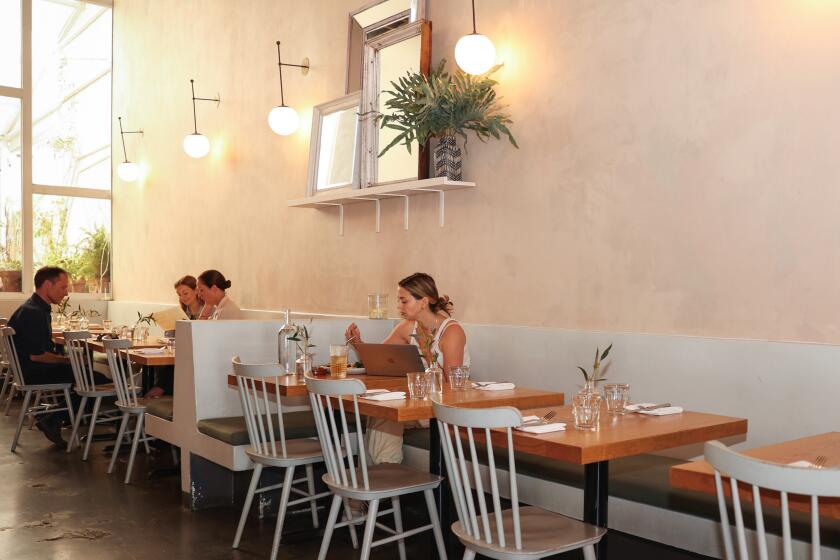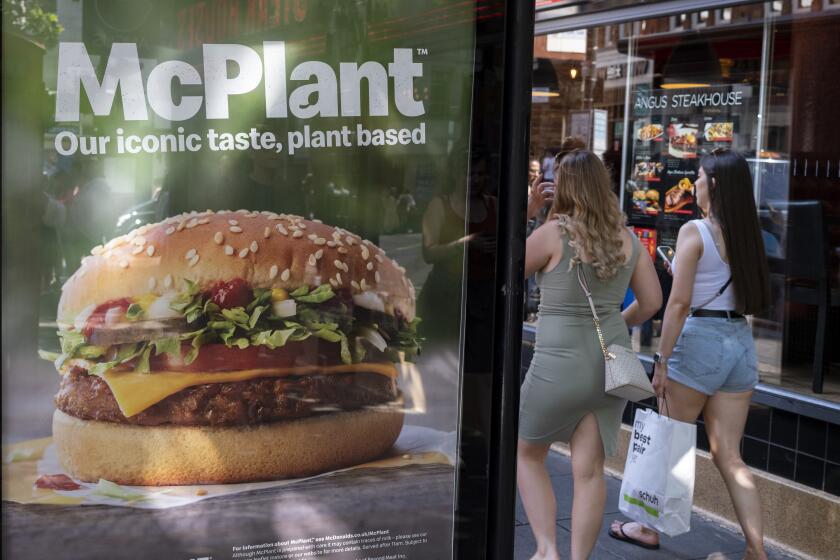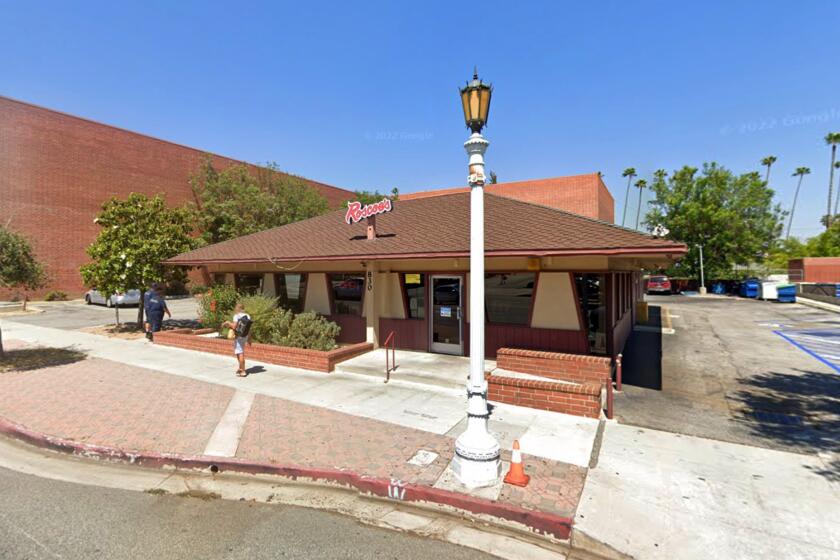California may end travel ban to states with anti-LGBTQ laws

When North Carolina in 2016 banned transgender people from using the bathroom of their gender identity in public buildings, California retaliated by banning state-funded travel to that state and any other state with laws it deemed discriminatory against LGBTQ people.
But seven years later, California now bans state-funded travel to nearly half of the country following a surge of anti-LGBTQ legislation in mostly Republican-led states.
The prohibition means sports teams at public colleges and universities have had to find other ways to pay for road games in states like Arizona and Utah. And it has complicated some of the state’s other policy goals, like using state money to pay for people who live in other states to travel to California for abortions.
Wednesday, state Senate leader Toni Atkins announced legislation that would end the ban and replace it with an advertising campaign in those states that promotes acceptance and inclusion for the LGBTQ community. The bill would set up a fund to pay for the campaign, which would accept private donations and state funding — if any is available.
“I think polarization is not working,” said Atkins, who is a lesbian. “We need to adjust our strategy. We know what we need to do, but we need to be able to be there to do it.”
Overturning the ban could be difficult in the California Legislature, where 10% of lawmakers now identify as LGBTQ. Assembly member Evan Low, a Democrat from Campbell who authored the travel ban in 2016 , said he supports the advertising campaign but said “we shouldn’t completely end California’s state-funded travel ban without having an alternative action in combating discrimination.”
“We can’t back down, especially as a record amount of anti-LGBTQ+ legislation is being introduced,” said Low, who is gay.
California’s travel ban has been in effect since 2017. The state Attorney General keeps a list of states subject to the ban, a list that has grown quickly as several states have passed laws restricting doctors from providing gender-affirming care to minors and stopping transgender women and girls from participating in school sports consistent with their gender identity .
Today, the ban includes 23 states: Alabama, Arizona, Arkansas, Florida, Georgia, Idaho, Indiana, Iowa, Kansas, Kentucky, Louisiana, Mississippi, Montana, North Carolina, North Dakota, Ohio, Oklahoma, South Carolina, South Dakota, Tennessee, Texas , Utah and West Virginia.
The law applies to state agencies, departments, boards, authorities and commissions — including the schools that are part of the University of California and the California State University systems.
That means schools like the University of California, Berkeley, can’t use state money for their football teams to travel to away games in Arizona and Utah — schools it must play against because they are in the same athletic conference.
The San Diego State University men’s basketball team will play in the Final Four on Saturday in Houston, a state that is on the no-travel list. The team got around the ban because the NCAA, not California taxpayers, is footing the bill for the team’s travel. But the ban does mean the school can’t schedule football games against teams in Texas, said Jamie McConeghy, senior associate athletic director of communications and media relations for San Diego State.
The law has a number of exceptions, including travel necessary to enforce California laws, meet contractual obligations or to obtain grant funding. It also allows travel for the protection of health and safety, which is why a state-funded security detail could travel with Gov. Gavin Newsom’s family on a vacation to Montana last year.
But it has complicated some of the Democrats’ policy goals in surprising ways. Last year, California agreed to spend $20 million to help women in other states travel to California for abortions in the aftermath of the U.S. Supreme Court overturning Roe v. Wade.
“We could help someone fly or travel to California, but when they had to go back to Texas or Florida or whatever any of those states, we actually couldn’t legitimately spend money to send them home,” Atkins said. “It starts to get complicated.”
Atkins said she will formally introduce the legislation on Thursday, which must be vetted by lawmakers in both the state Senate and state Assembly before it could become law — a process that will take several months.
“When you disagree with someone, you should try to open their eyes to change hearts and minds, not pretend they don’t exist,” said Assemblymember Greg Wallis, a Republican from Bermuda Dunes. “I’m glad California is coming around to that approach.”
Marc Stein, a history professor at San Francisco State University who is gay and does research on queer history, said he would want to hear from LGBTQ communities in other states before deciding whether he supports lifting the travel ban.
But Stein said he would like to see an exception made for social justice research. Shortly after California’s travel ban took place, he said he had trouble booking a trip to North Carolina shortly after the travel ban took effect so he could research the case of a transgender woman who had been arrested for sodomy in the 1960s.
Stein said the university eventually found a way to fund his research, but said the barrier remains for other researchers, particularly students studying for advanced degrees.
“I think Ph.D. students in California are being discouraged from pursuing research projects that would require extensive trips to the list of states which is now almost half the country,” he said.
- Election 2024
- Entertainment
- Newsletters
- Photography
- Personal Finance
- AP Investigations
- AP Buyline Personal Finance
- AP Buyline Shopping
- Press Releases
- Israel-Hamas War
- Russia-Ukraine War
- Global elections
- Asia Pacific
- Latin America
- Middle East
- Election Results
- Delegate Tracker
- AP & Elections
- Auto Racing
- 2024 Paris Olympic Games
- Movie reviews
- Book reviews
- Financial Markets
- Business Highlights
- Financial wellness
- Artificial Intelligence
- Social Media

California lawmakers vote to end travel ban to states with anti-LGBTQ+ laws
FILE - Senate President Pro Tempore Toni G. Atkins, D-San Diego, the first openly LGBTQ+ person to lead the statehouse’s upper chamber, speaks at the inauguration of Karen Bass, the first Black woman elected Los Angeles mayor, on Sunday, Dec. 11, 2022. The state Assembly passed Atkins’ bill to end a ban on state-funded travel to states with anti-LGBTQ+ law on Monday, Sept. 11, 2023. (AP Photo/Damian Dovarganes, File)
- Copy Link copied
SACRAMENTO, Calif. (AP) — California may soon lift a ban on state-funded travel to states with anti-LGBTQ+ laws and instead focus on an advertising campaign to bring anti-discrimination messages to red states.
California started banning official travel to states with laws it deemed discriminatory against LGBTQ+ people in 2017, starting with Kansas, Mississippi, North Carolina and Tennessee. Since then, the list has grown to include a total of 26 states, most of them Republican-led, following a surge of anti-LGBTQ+ legislation these past few years.
The prohibition has prevented elected officials, state workers and university scholars from traveling to more than half of the country using the state’s money. That has posed a significant challenge to sports teams at public colleges and universities, which have had to find alternative funding sources to pay for their road games in states like Arizona and Utah. It has also complicated some of the state’s other policy goals, like using state money to pay for people who live in other states to travel to California for abortions.
California lawmakers in the state Assembly on Monday passed legislation to end the travel ban. The bill, introduced by state Senate leader Toni Atkins, would also establish an outreach and advertising campaign in states on the travel ban list to promote pro-LGBTQ+ messages. Atkins, who is a lesbian, said the travel ban has helped raise awareness about many anti-LGBTQ+ issues, but it has also led to unintended consequences.
“In many instances, the travel ban has inadvertently caused California to isolate its services and citizens in a time when we are leading the nation in ensuring inclusivity and freedom,” said Democratic Assemblymember Rick Zbur, the former executive director of the advocacy group Equality California. “With nearly 500 anti-LGBTQ bills having been introduced in legislatures nationwide this year alone, now more than ever, we need to reach into those communities with messages of support, inclusivity and understanding.”
Some Republicans voted against overturning the ban, but there was no debate.
The bill will head to the Senate for a final vote before landing on Gov. Gavin Newsom’s desk. The Democratic governor has until Oct. 14 to decide whether to sign it into law. The governor’s office said he will evaluate the bill on its merits.
The reversal on the travel ban comes amid intense political battles across the country over transgender rights, including efforts to impose bans on gender-affirming care , bar trans athletes from girls and women’s sports, and require schools to notify parents if their children ask to use different pronouns or changes their gender identity.
The legislation is among nearly 1,000 bills that lawmakers have been debating during the hectic final two weeks of the Legislative session. The Legislature has until Sept. 14 to act on these bills.
IN-STATE COMMUNITY COLLEGE TUITION FOR MEXICAN RESIDENTS
The Assembly also voted to send a bill to Newsom that would allow some low-income Mexican residents living within 45 miles (72 kilometers) of the California-Mexico border to get in-state tuition at certain community colleges in Southern California. If approved, this pilot program would be in effect until 2029.
Supporters of the bill say it would help expand access to education for eligible students and help them enter the workforce in the future. That includes Southern California advocacy group Los Amigos de la Comunidad, which in English means “Friends of the Community.”
“There are barriers to education at all levels,” said Eric Montoya Reyes, the group’s executive director. “It can be burdensome to add another obstacle of nonresident fees to their ability to get an education.”
NEW RULES FOR SELF-DRIVING TRUCKS
The California Senate voted to require self-driving semitrucks to always have a human present to oversee it.
California has been at the forefront of self-driving vehicles. Last month, state regulators allowed two companies to operate autonomous taxis in San Francisco.
Labor unions are worried the technology could soon be applied to semitrucks, replacing drivers at the heart of the nation’s $900 billion trucking industry. The bill lawmakers approved on Monday would not ban self-driving semitrucks. But it would require a human to be present.
The bill now heads to Gov. Gavin Newsom, who must decide whether to sign it into law. His administration has signaled its opposition to the bill , arguing it would stifle innovation.
NEW RULES FOR CONCEALED CARRY PERMITS
The California Assembly on Monday voted to ban people from carrying guns in most public places.
The new rules come after a U.S. Supreme Court decision last year changed how the courts interpret gun laws. California lawmakers tried to pass new rules last year, but they failed because of a tactical error on the final day of the legislative session.
This year, lawmakers tried again. The bill bans people from carrying guns in privately owned commercial businesses that are open to the public — unless the business posts a sign saying guns are OK. The bill bans carrying guns in nearly every other public place, including schools, courts, government buildings, prisons, hospitals, airports, zoos, churches, zoos, museums, amusement parks and banks.
The bill has already passed the state Senate, but it requires one more vote before lawmakers can send it to Gov. Gavin Newsom’s desk.
INCREASING PENALTIES FOR HUMAN TRAFFICKERS
A bill that would increase the penalties for child traffickers cleared another key hurdle Monday.
The bill, which Newsom stepped in to revive after it was blocked in an Assembly committee in July, passed the state Assembly with a unanimous vote.
The bill would add child trafficking to a list of serious felonies in California. Anyone convicted of at least three serious felonies faces a prison sentence of between 25 years to life in prison under the state’s three-strikes law.
Some lawmakers initially opposed the bill, concerned it could inadvertently punish child trafficking victims with lengthy prison penalties. Republican state Sen. Shannon Grove, the author of the bill, added an amendment to protect victims from the enhanced penalties.
The bill will need a final vote from the Senate before heading to Newsom’s desk.
Associated Press reporters Sophie Austin and Adam Beam contributed. Austin is a corps member for the Associated Press/Report for America Statehouse News Initiative. Report for America is a nonprofit national service program that places journalists in local newsrooms to report on undercovered issues. Follow Austin @sophieadanna
California News | Gov. Newsom signs bill replacing California’s…
Share this:.
- Click to share on Facebook (Opens in new window)
- Click to share on Twitter (Opens in new window)
- Click to print (Opens in new window)
- Click to email a link to a friend (Opens in new window)
- Click to share on Reddit (Opens in new window)
Today's e-Edition
- Latest News
- Environment
- Transportation
Breaking News
California news | the supreme court allows emergency abortions in idaho for now in a limited ruling, california news, subscriber only, california news | gov. newsom signs bill replacing california’s state travel ban over lgbtq laws with outreach funding, travel ban expanded to 26 states in july.

The ban began with legislation by Assemblyman Evan Low, a Cupertino Democrat, in 2016 that initially restricted state-funded travel to four states: Kansas, Mississippi, North Carolina and Tennessee. But that number doubled in the law’s first year. It was at 23 states when, in July, Attorney General Rob Bonta announced his office was adding three more states — Missouri, Nebraska and Wyoming — to the list, bringing it to 26.
The growing list created problems for state leaders. Legislative analysts reported that California lawmakers had to use their own political funds to attend a National Conference of State Legislatures in Tennessee, and that others skipped events in prohibited states.
It also became a liability for Newsom, who was criticized last year for traveling to one of the banned states, Montana , to visit his wife’s family. Newsom’s office said at the time such personal and privately paid travel is not considered state sponsored but declined to say whether California footed the bill for his security staff.
State Sen. pro Tempore Toni Atkins, the powerful San Diego Democrat who authored the bill Newsom signed Wednesday, said the growing number of prohibited states suggested the ban wasn’t working and that a new approach is needed.
Her bill calls for a “BRIDGE Project” — which she said would “create a fund that could be used to create non-partisan, inclusive messaging, discourage discrimination, and help members of the LGBTQ+ community feel less isolated.”
The legislature approved the law as an urgency measure, and it became effective immediately.
Legislative analysts said the bill would authorize outreach efforts through the Governor’s Office of Business and Economic Development, or GO-Biz. It would cost taxpayers “about $583,000 annually for four staff at GO-Biz to oversee the BRIDGE Project fund as well as ongoing costs for the BRIDGE Projects’ education, marketing, and advertising campaigns,” analysts said, though “state costs could be offset by donations.”
Supporters argued it would “develop marketing campaigns designed to raise awareness and educate the public” in other states, while opponents said it would amount to “funding advertising and media specifically aimed at unduly influencing other states’ laws.”
Newsom in a statement thanked Atkins for “this important measure that enables California to continue taking a stand for the rights of LGBTQ+ people throughout the country and combating intolerance and hate with empathy and allyship.”
“In the face of a rising tide of anti-LGBTQ+ hate, this measure helps California’s message of acceptance, equality and hope reach the places where it is most needed,” Newsom said.
The state laws that led California to expand its travel ban mostly dealt with transgender access to school bathrooms, participation in youth sports and “gender affirming” hormonal and surgical procedures on children, a matter that has roiled school boards, health care and athletics in recent years. Advocates for those laws argue that the policies protect girls’ rights and kids, while critics called them anti-LGBTQ.
Statistics provided by the Human Rights Campaign, a pro-LGBTQ group, seemed to affirm that the travel ban wasn’t effective in preventing anti-trans or anti-LGBTQ laws and policies. The group reported in May that a record 520 “anti-LGBTQ+ bills” have been introduced in state legislatures. The group said 70 laws have been enacted, including 15 “banning gender affirming care for transgender youth,” seven “allowing misgendering of transgender students,” four “censoring school curriculum” and two “targeting drag performances.”
“With an unprecedented number of anti-LGBTQ+ bills having been introduced in state legislatures nationwide, California can further position itself as a national leader on inclusivity and serve as a beacon of hope and support for those who have been isolated by state-sponsored discrimination elsewhere,” Atkins said.
Low, who is gay, has defended AB 1887 and argued that repealing it would amount to backing down in the face of anti-LGBTQ+ legislation.
“While the removal of our state-funded travel ban to these states does not protect Californians from potential harm,” Low said in a statement Thursday, “I am hopeful that the BRIDGE project will help change hearts and minds in states that have pursued and enacted anti-LGBTQ laws.”
- Report an error
- Policies and Standards
More in California News

Restaurants, Food and Drink | Taco Bell has a new $7 Luxe Cravings Box

California Politics | California passes new workplace indoor heat rules. Again.

Real Estate | California home prices hit another record high at $908,040

Crime and Public Safety | How an idea to fight shoplifting in California may even affect who controls Congress
State-funded Travel Restrictions Lifted by SB 447
Governor Newsom signed SB 447 which ends the ban on state-funded travel to any of the 24 states that were listed on the California Attorney General's website . The bill was signed on September 13 and takes effect immediately, which means that all travel restrictions to those 24 states on the banned list have now been completely lifted. Business and Finance Bulletin G-28, Travel Regulations , will be revised to remove the AB 1887 language that had previously prohibited travel to the states listed on the California Attorney General’s website when using state fund sources. If you have any questions, please contact the Travel Team at [email protected] .
We've detected unusual activity from your computer network
To continue, please click the box below to let us know you're not a robot.
Why did this happen?
Please make sure your browser supports JavaScript and cookies and that you are not blocking them from loading. For more information you can review our Terms of Service and Cookie Policy .
For inquiries related to this message please contact our support team and provide the reference ID below.
Watch CBS News
California may end travel ban to states with anti-LGBT laws
By ADAM BEAM Associated Press
March 29, 2023 / 3:12 PM PDT / AP
SACRAMENTO — When North Carolina in 2016 banned transgender people from using the bathroom of their gender identity in public buildings, California retaliated by banning state-funded travel to that state and any other state with laws it deemed discriminatory against LGBTQ people.
Seven years later, after a surge in anti-LGBTQ legislation in mostly Republican-led states, California now bans state-funded travel to nearly half of the country. The prohibition has caused travel hitches for state employees as well as academic researchers and sports teams at public colleges and universities, prompting state Senate leader Toni Atkins to call Wednesday for the travel ban to come to an end.
In its place, she wants the state to authorize a marketing campaign for "inclusive messaging" in those states "to help build a bridge of inclusion and acceptance."
"The goal here is to speak to people's hearts and open minds," said Atkins, who is a lesbian. "That's a pursuit that would have made teen Toni — that southwest Virginia girl afraid to be herself back then — so proud."
California's travel ban has been in effect since 2017. It requires the state Attorney General to maintain a list of states subject to the ban. That list has grown quickly as states have passed laws restricting doctors from providing gender-affirming care to minors and stopping transgender women and girls from participating in school sports consistent with their gender identity.
Today, the ban includes 23 states: Alabama, Arizona, Arkansas, Florida, Georgia, Idaho, Indiana, Iowa, Kansas, Kentucky, Louisiana, Mississippi, Montana, North Carolina, North Dakota, Ohio, Oklahoma, South Carolina, South Dakota, Tennessee, Texas, Utah and West Virginia.
The law applies to state agencies, departments, boards, authorities and commissions — including the schools that are part of the University of California and the California State University systems.
That means schools like the University of California, Berkeley, can't use state money for their football teams to travel to away games in Arizona and Utah — schools it must play against because they are in the same athletic conference.
The San Diego State University men's basketball team will play in the Final Four on Saturday in Houston, a state that is on the no-travel list. The team got around the ban because the NCAA, not California taxpayers, is footing the bill for the team's travel. But the ban does mean the school can't schedule football games against teams in Texas, said Jamie McConeghy, senior associate athletic director of communications and media relations for San Diego State.
The law has a number of exceptions, including travel necessary to enforce California laws, meet contractual obligations or to obtain grant funding. It also allows travel for the protection of health and safety, which is why a state-funded security detail could travel with Gov. Gavin Newsom's family on a vacation to Montana last year.
The ban has also impeded academic researchers who often have to travel to other states for their work. The American Historical Association wrote a letter to lawmakers in 2021 asking them to amend the list of exceptions to include research for travel and educational initiatives.
Marc Stein, a history professor at San Francisco State University, said he had trouble booking a trip to North Carolina shortly after the travel ban took effect so he could research the case of a transgender woman who had been arrested for sodomy in the 1960s.
Stein said the university eventually found a way to fund his research, but said the barrier remains for other researchers, particularly students studying for advanced degrees.
"I think Ph.D. students in California are being discouraged from pursuing research projects that would require extensive trips to the list of states which is now almost half the country," said Stein, who said he favors adding a broad exception to the law to cover academic research.
Still, overturning the ban could be difficult in the California Legislature, where 10% of lawmakers identify as LGBT Q.
Featured Local Savings
More from cbs news.

New campaign launched to prevent illegal fireworks from entering California

El Dorado County winery's fire insurance jumps to $20k per year

Tesla travels onto train track in Woodland. Was it a driver or autopilot issue?

California Gov. Newsom criticized for pre-recording State of the State address
- Share full article
Advertisement
California bans state-funded travel to 5 states over anti-L.G.B.T.Q. laws.
Attorney General Rob Bonta added Arkansas, Florida, Montana, North Dakota and West Virginia to a list that now includes 17 states in total.

By Jill Cowan
- June 28, 2021
California will ban state-funded travel to Arkansas, Florida, Montana, North Dakota and West Virginia in response to anti-L.G.B.T.Q. legislation in those places, officials announced on Monday.
“There has been a coordinated attack on fundamental civil rights,” Rob Bonta, California’s attorney general, said at a news conference. “It’s about aligning our dollars with our values.”
There are now 17 states under California’s ban, including Texas, Tennessee, and North and South Carolina.
The law, approved by the state legislature in 2016, requires California to add states to the list if they enact measures that discriminate against or remove protections for people on the basis of sex, gender identity or sexual orientation. It was enacted amid backlash against states where lawmakers were trying to pass “ bathroom bills ” to prevent transgender people from using restrooms that aligned with their gender identity.
Mr. Bonta is a progressive ally of Gov. Gavin Newsom , who chose him for the post in March after Xavier Becerra joined the Biden administration. He has pledged to hold the police accountable for misconduct and to make it easier to fight hate crimes as attacks on Asian Americans surge.
Evan Low, a California lawmaker who wrote the ban, said it was meant to keep state workers safe and out of situations where they might be discriminated against.
“The current culture war is not a game,” he said.
In 2017, Mr. Low acknowledged that barring state-funded travel to Texas was largely symbolic . Still, he said this week that he hoped California’s moves would prompt big businesses to follow suit.
Officials didn’t say how much money the state had withheld as a result of the ban. But Richard C. Auxier, a researcher at the Tax Policy Center , said that while the amount might be relatively small, the effects could snowball.
He cited North Carolina’s “bathroom bill,” which prompted a national outcry after it was enacted in 2016. In addition to travel bans like California’s, the N.C.A.A. and the N.B.A. moved tournaments in protest, and performers refused to play gigs there. The law was repealed, and the state’s Republican governor was ousted in part because of frustration over the economic fallout.
The question is how much state lawmakers respond to economic pain felt by local businesses and governments as they try to coax back visitors lost during the pandemic.
“These cities are all dying for people to come back — to go to the bars, to go to events,” Mr. Auxier said, so if other organizations take their cues from California, local tourism groups or businesses could be hurt enough to prompt them to push back against their leaders.
“‘Will it work?’ is a giant political question,” he said.
Ryland Whittington, a 13-year-old from San Diego, said at Monday’s news conference that the ability to feel safe, play sports and get any care he needed wasn’t political, in no small part because of where he lives.
“Being trans is just a small part of who I am,” he said. “I know I’m lucky to live in California.”
He asked lawmakers to “give all kids the opportunity to be happy, healthy and to live their lives in freedom and peace.”
Jill Cowan is the Californ ia Today correspondent, keeping tabs on the most important things happening in her home state every day. More about Jill Cowan
Breaking News
Lawmakers’ last-minute reversal could let restaurants keep service fees

- Copy Link URL Copied!
California restaurateurs are counting the days to July 1, when a statewide law is set to ban restaurants, bars, hotels, concert venues and other businesses from charging service fees — sending the hospitality industry into a tailspin . But a new emergency measure unanimously approved by the state Assembly on Tuesday could exempt restaurants and bars from the law if signed by Gov. Gavin Newsom.
Signed into law last October, Senate Bill 478 prohibits “hidden fees” such as service charges. In restaurants and bars, these fees can appear as additional costs on the menu or final bill, ranging from 1% to 22% or even more. The practice is regularly used to stabilize wages across dining rooms and kitchens — where servers often receive tips but cooks and dishwashers do not — and to help offset the cost of benefits such as healthcare.
But the practice has been called into question, with multiple lawsuits filed against restaurateurs over their distribution and use of service fees .

What does a service fee ban mean for diners? Expect higher menu prices — a lot higher
A state ‘junk fees’ law might ‘upend’ how restaurants operate. Customers could face sticker shock when fees are rolled into menu prices.
Feb. 15, 2024
Sens. Bill Dodd (D-Napa) and Nancy Skinner (D-Berkeley) co-wrote SB 478 in what they called an effort to protect consumers from surprise fees. In early June Dodd proposed Senate Bill 1524 , a new emergency measure that would clarify aspects of his original bill and, if passed, exempt restaurants from eliminating surcharges, provided they are listed clearly.
“Any mandatory gratuity, service charge or other fee charged by restaurants must be displayed conspicuously on restaurant menus,” a statement from Dodd’s office said. “For example, if a restaurant adds a 20% security fee to all bills, that 20% charge must be clearly stated up front on the menu. It cannot be a surprise that only shows up when the bill arrives.”
SB 1524 would take effect immediately. It is co-authored by Sen. Scott Wiener (D-San Francisco) and Assemblymembers Matt Haney (D-San Francisco), Jesse Gabriel (D-Encino) and Cecilia Aguiar-Curry (D-Winters).

Restaurants may be able to keep service fees if menu shows the charges
Reversing course, the author of a bill to ban junk fees has proposed emergency legislation to carve out an exemption for restaurants.
June 6, 2024
“This measure has enjoyed unanimous bipartisan support, and recent amendments have responded to concerns from some consumer groups,” Haney said in an address to the Assembly on Tuesday. It passed unanimously with 79 votes.
In February a representative for Atty. Gen. Rob Bonta, who co-sponsored SB 478, told the Los Angeles Times that restaurants and bars would need to roll what were previously listed surcharge percentages into the list prices of menus and confirmed the guidance in “price transparency law” guidelines last month.
SB 478 would not impose fines on restaurants but could open them up to lawsuits come July 1. A number of California restaurants and bars have already begun eliminating surcharges entirely or rolling the fees into menu prices, per the attorney general’s guidance. Others have been watching the progression of SB 1524 since its introduction on June 6. Many restaurateurs told the L.A. Times that rolling surcharge fees into menu pricing would cost them customers due to sticker shock at an already fraught time for the industry.
“Restaurants are vital to the fabric of life in California, and they should be able to cover costs as long as they do so transparently,” Wiener, a co-author of the new bill, said in a statement earlier this month. “SB 1524 clarifies portions of the law that pose a serious threat to restaurants. The bill strikes the right balance between supporting restaurants and delivering transparency for consumers, and I’m proud to support it.”
After Tuesday’s approval in the Assembly, SB 1524 will proceed to the Senate, where it requires a passing vote before it reaches Newsom.
More to Read

Hotel and Airbnb price tags may soon spike. For travelers, that’s a good thing
June 18, 2024

California is making restaurants tell the truth about prices. Will it give you sticker shock?
May 13, 2024

Perch charges diners ‘security’ fee at downtown L.A. rooftop spot, sparking outrage
April 10, 2024
Eat your way across L.A.
Get our weekly Tasting Notes newsletter for reviews, news and more.
You may occasionally receive promotional content from the Los Angeles Times.

Stephanie Breijo is a reporter for the Food section and the author of its weekly news column. Previously, she served as the restaurants and bars editor for Time Out Los Angeles, and prior to that, the award-winning food editor of Richmond magazine in Richmond, Va. Born and primarily raised in Los Angeles, she believes L.A. to be the finest food city in the country and might be biased on that count but doesn’t believe she’s wrong.
More From the Los Angeles Times

Some of L.A.’s best ice cream expands with new Larchmont flagship
June 27, 2024

McDonald’s plant-based burger fizzles out — even in San Francisco, company says
June 26, 2024

Roscoe’s House of Chicken ’n Waffles closes Pasadena location after three decades
June 25, 2024
![california travel ban update LOS ANGELES, CA - JUNE 17: [Cody Ma and Misha Sesar share a few dishes from their Persian Restaurant Azizam] on Monday, June 17, 2024 in Los Angeles, CA. (Ethan Benavidez / For The Times)](https://ca-times.brightspotcdn.com/dims4/default/6852a0e/2147483647/strip/true/crop/5126x3417+298+0/resize/840x560!/quality/75/?url=https%3A%2F%2Fcalifornia-times-brightspot.s3.amazonaws.com%2F79%2Fdc%2F4d29255545f5b9813315901692bc%2F1459972-fo-azizam-review20-eba.JPG)
Review: A giant meatball is the gateway dish to L.A.’s best new Persian restaurant in years

Security Alert May 17, 2024
Worldwide caution, update may 10, 2024, information for u.s. citizens in the middle east.
- Travel Advisories |
- Contact Us |
- MyTravelGov |
Find U.S. Embassies & Consulates
Travel.state.gov, congressional liaison, special issuance agency, u.s. passports, international travel, intercountry adoption, international parental child abduction, records and authentications, popular links, travel advisories, mytravelgov, stay connected, legal resources, legal information, info for u.s. law enforcement, replace or certify documents.
Share this page:
Learn about your destination
Take 90 seconds for safer travel.
Travel Advisory Levels
Enroll in step.

Subscribe to get up-to-date safety and security information and help us reach you in an emergency abroad.
Recommended Web Browsers: Microsoft Edge or Google Chrome.
External Link
You are about to leave travel.state.gov for an external website that is not maintained by the U.S. Department of State.
Links to external websites are provided as a convenience and should not be construed as an endorsement by the U.S. Department of State of the views or products contained therein. If you wish to remain on travel.state.gov, click the "cancel" message.
You are about to visit:
California Gov. Gavin Newsom signs bills to bolster protections for LGBTQ people
SACRAMENTO, Calif. – California Gov. Gavin Newsom signed several bills over the weekend aimed at bolstering the state’s protections for LGBTQ people, after issuing a controversial veto that was criticized by advocates.
The new laws include legislation that focuses on support for LGBTQ youth. One law sets timelines for required cultural competency training for public school teachers and staff, while another creates an advisory task force to determine the needs of LGBTQ students and help advance supportive initiatives. A third requires families to show that they can and are willing to meet the needs of a child in foster care regardless of their sexual orientation or gender identity.
“California is proud to have some of the most robust laws in the nation when it comes to protecting and supporting our LGBTQ+ community, and we’re committed to the ongoing work to create safer, more inclusive spaces for all Californians,” Newsom said in a statement on Saturday. “These measures will help protect vulnerable youth, promote acceptance, and create more supportive environments in our schools and communities.”
The governor also signed legislation that requires schools serving first through 12th grade to have at least one gender-neutral bathroom available for students by 2026.
The law was spurred by a Southern California school district that instituted a policy requiring schools to tell parents when their children change their pronouns or use a bathroom of a gender other than the one listed on their official paperwork. A judge halted the policy after California Attorney General Rob Bonta sued the Chino Valley Unified School District . The lawsuit is ongoing.
The governor’s bill-signings came after Newsom vetoed a bill on Friday that would have required judges to consider whether a parent affirms their child’s gender identity when making custody and visitation decisions.
Assembly member Lori Wilson, a Democrat who introduced the bill and has an adult son who came out as transgender when he was a teenager, was among the LGBTQ advocates who criticized the governor’s decision.
“I’ve been disheartened over the last few years as I watched the rising hate and heard the vitriol toward the trans community. My intent with this bill was to give them a voice, particularly in the family court system where a non-affirming parent could have a detrimental impact on the mental health and well-being of a child,” Wilson said in a statement.
California state Sen. Scott Wiener, who co-sponsored the bill, called Newsom's veto "a tragedy for trans kids," according to a statement posted on X, formerly known as Twitter.
"Governor Newsom has been such a staunch ally to the LGBTQ community. A true champion. Respectfully, however, this veto is a mistake," Wiener added.
Newsom said existing laws already require courts to consider health, safety and welfare when determining the best interests of a child in custody cases, including the parent’s affirmation of the child’s gender identity.
The veto comes amid intense political battles across the country over transgender rights, including efforts to impose bans on gender-affirming care , bar trans athletes from girls and women’s sports, and require schools to notify parents if their children ask to use different pronouns or changes their gender identity.
Contributing: Christopher Cann, USA TODAY
- Skip to main content
- Keyboard shortcuts for audio player
Weekend Edition Sunday
- Latest Show
Sunday Puzzle
- Corrections
Listen to the lead story from this episode.
Politics chat: Trump and Biden's policy agendas will take center stage at the debate
by Ayesha Rascoe , Mara Liasson
Russia is finding new supporters after being isolated by the West
by Charles Maynes
State laws complicate the federal ban on gun possession for domestic abusers
by Paige Pfleger , Ayesha Rascoe
Middle East
Lebanon is home to the most refugees per capita. now it wants to send some of them back.
by Jane Arraf
Lebanon is home to the most number of refugees. Now it wants to send some of them back
Jonathan merritt's book reminds kids what makes them different makes them special.
by Jason DeRose
GOP lawmakers in Connecticut block phaseout of new gas-powered vehicle sales
by Molly Ingram
Republican lawmakers in Connecticut fight against a future ban on gas-powered vehicles

Sunday Puzzle NPR hide caption
Sunday Puzzle: Summer movie blockbusters
by Will Shortz
Years before intimacy coordinators on Hollywood sets, there was the 1996 film Bound
by Isabella Gomez Sarmiento
Music Interviews
Agalisiga mackey reflects on writing songs in his native cherokee language.
by Ryan Benk , Ayesha Rascoe
Tsitsutsa Tsigesv reflects on writing songs in his native Cherokee language
How biden is getting ready for his high-stakes debate with former president trump.
by Asma Khalid
Young Black voters are feeling increasingly ambivalent about the Democratic Party
by Ayesha Rascoe
Hungary's far-right leader is set to take over rotating presidency of the EU
If ai provides false information, who takes the blame, the hottest new concert venue could be your local cemetery.
by Alison Cuddy
Health Care
'medicaid unwinding' can be dangerous for those who need opioid addiction medications.
by Stephanie Colombini
'Road to Rickwood' traces the history of the Major League's newest field
'return to rickwood' traces the history of the major league's newest field, author interviews, an incident at a grocery store set sadie dingfelder down the path of writing her book.
Searching for a song you heard between stories? We've retired music buttons on these pages. Learn more here.
Japanese Government Panel Proposes Air Traffic Control Measures to Boost Safety After Haneda Crash
A Japanese transport ministry panel has proposed a number of air traffic control measures to boost safety

FILE - A burnt Japan Airlines plane at Haneda airport, Tokyo, Jan. 4, 2024. A Japanese transport ministry panel on Monday June 24, 2024, proposed a number of air traffic control measures to boost safety, more than six months after a fatal collision between a Japan Airlines jetliner and a coast guard plane at Tokyo’s Haneda Airport. (Kyodo News via AP, File)
TOKYO (AP) — A Japanese transport ministry panel on Monday proposed a number of air traffic control measures to boost safety, more than six months after a fatal collision between a Japan Airlines jetliner and a coast guard plane at Tokyo’s Haneda Airport.
The panel recommended hiring more air traffic control staff at the country’s major airports, and introducing supplementary alert systems on the runway and in the traffic control room.
The proposal was released in an interim report compiled by a panel of experts commissioned by the ministry, which said that additional staff would reduce air traffic controllers' heavy workloads. Their responsibilities include monitoring runways, communicating with pilots and coordinating with other air control staff.
The recommendations includes hiring more air traffic control staff at Haneda, one of the world's busiest airports, and seven other airports, including New Chitose, Narita, Kansai and Naha.
The Jan. 2 collision occurred when Japan Airlines Flight 516, carrying 379 passengers and crew, landed right behind the coast guard aircraft preparing to take off on the same seaside runway, engulfing both aircraft in flames .
All occupants of the JAL’s Airbus A350-900 airliner safely evacuated in 18 minutes. The captain of the coast guard’s much smaller Bombardier Dash-8 escaped with burns but five crew members died.
The investigation into the collision has focused on what caused the coast guard flight crew to believe they had a go-ahead for takeoff. A partial release of the air traffic control transcript has shown no clear takeoff approval was given to the coast guard plane.
Investigation of the collision by the Japan Transport Safety Board is still pending.
On Monday, the report also called for introducing an alert system called Runway Status Lights, or RWSL, with lights embedded in the pavement of runways and taxiways. They are designed to automatically alert pilots and vehicle operators when it's unsafe to enter, without having input from controllers. The system is already used widely in the United States and at a few airports in Japan, but not Haneda.
The panel also proposed adding an alert sound to the monitoring system for aircraft positions as a backup in case a warning display is overlooked.
Transport Minister Tetsuo Saito submitted the report to Prime Minister Fumio Kishida and pledged to firmly take measures proposed in the report, prioritizing a staffing increase before the summer travel season hits full swing.
Copyright 2024 The Associated Press . All rights reserved. This material may not be published, broadcast, rewritten or redistributed.
Photos You Should See - June 2024

Join the Conversation
Tags: Associated Press , business , world news
America 2024

Healthiest Communities
Your trusted source for in-depth analysis on the issues impacting your community’s well-being delivered right to your inbox.
Sign in to manage your newsletters »
Sign up to receive the latest updates from U.S News & World Report and our trusted partners and sponsors. By clicking submit, you are agreeing to our Terms and Conditions & Privacy Policy .
You May Also Like
The 10 worst presidents.
U.S. News Staff Feb. 23, 2024

The Best Cartoons on Donald Trump
June 26, 2024, at 3:32 p.m.

Joe Biden Behind The Scenes
June 7, 2024

Economy Slows But Grows in Q1
Tim Smart June 27, 2024

SCOTUS Hands Biden Social Win
Laura Mannweiler June 26, 2024

The Surge in Dengue, Explained
Cecelia Smith-Schoenwalder June 26, 2024

SCOTUS Update: Abortion, Guns and Trump

Sales of New Homes Slump in May
Tim Smart June 26, 2024

Moon Sample Success Boosts China
Cecelia Smith-Schoenwalder June 25, 2024

The Julian Assange Saga
Aneeta Mathur-Ashton June 25, 2024


COMMENTS
SB 447 Rescinds Use of State Funds Travel Prohibition. As of September 13 th, 2023, all travel restrictions based on AB 1887 to any of the 24 states that had enacted anti-LGBTQ+ legislation have been lifted and takes effect immediately. Governor Newsom signed SB 447 ending the ban on state funded travel to the states previously listed on the California Attorney Generals website.
Per Senate Bill 447 (2023), Assembly Bill 1887 (2016) is no longer in effect, and the State of California's restriction on state-funded travel has been eliminated.
California lawmakers in the state Assembly on Monday passed legislation to end the travel ban. The bill, introduced by state Senate leader Toni Atkins, would also establish an outreach and ...
California's travel ban has been in effect since 2017. The state Attorney General keeps a list of states subject to the ban, a list that has grown quickly as several states have passed laws ...
Democratic leader wants California to repeal ban on government travel to anti-LGBTQ states. March 29, 2023. Lawmakers set aside $5 million in the state budget to launch the media campaign required ...
The state Assembly passed Atkins' bill to end a ban on state-funded travel to states with anti-LGBTQ+ law on Monday, Sept. 11, 2023. (AP Photo/Damian Dovarganes, File) By TRÂN NGUYỄN. Updated 7:39 PM PDT, September 11, 2023. SACRAMENTO, Calif. (AP) — California may soon lift a ban on state-funded travel to states with anti-LGBTQ+ laws ...
California Assembly Bill 1887, or AB 1887, is a state statute that banned state-funded and sponsored travel to states with laws deemed discriminatory against the LGBTQ community. The bill includes exceptions for some types of travel the state has defined as necessary. Before the bill's repeal, travel to 23 states was banned. The law passed on September 27, 2016, and applied to four states.
Gov. Gavin Newsom has signed a bill effectively ending California's travel ban to more than half of U.S. states over their LGBTQ laws, acknowledging that it was more trouble than it was worth ...
Governor Newsom signed SB 447 which ends the ban on state-funded travel to any of the 24 states that were listed on the California Attorney General's website. The bill was signed on September 13 and takes effect immediately, which means that all travel restrictions to those 24 states on the banned list have now been completely lifted.
California law bans state business travel to other states with discriminatory laws against LGBTQ+ people. With 26 states now on the list, lawmakers are talking about repealing the travel ban.
July 19, 2022. . North Carolina is one of 22 states that California employees cannot travel to on the state's dime. Charlotte, N.C., above. Travis Dove for The New York Times. In 2016, amid ...
Software Updates; Manage Contracts and Orders; Support. Americas +1 212 318 2000. EMEA +44 20 7330 7500. Asia Pacific +65 6212 1000. ... California Set to End Travel Ban to States With Anti-LGBTQ ...
Three states were recently included in the ban, which was enacted in 2016. The government of California now prohibits official state travel to more than half the states, after Attorney General Rob ...
SACRAMENTO, Calif. (CN) — California Governor Gavin Newsom Wednesday signed a bill lifting the state-funded travel ban to parts of the country with anti-LGBTQ+ laws a day after it passed the state Legislature. But while removing the travel ban, Senate Bill 447 also creates a new program called the BRIDGE Project (Building and Reinforcing ...
SAN FRANCISCO - California Attorney General Rob Bonta today announced that California will restrict state-funded travel to Arkansas, Florida, Montana, North Dakota, and West Virginia as a result of new anti-LGBTQ+ legislation recently enacted in each state. The states are a part of a recent, dangerous wave of discriminatory new bills signed into law in states across the country that directly ...
All travelers arriving in or returning to California from other states or countries should test 3-5 days after arrival. All travelers who test positive or develop symptoms of COVID-19 should isolate and follow public health recommendations. California Department of Public Health PO Box, 997377, MS 0500, Sacramento, CA 95899-7377 Department ...
California's travel ban has been in effect since 2017. It requires the state Attorney General to maintain a list of states subject to the ban. That list has grown quickly as states have passed ...
June 28, 2021. California will ban state-funded travel to Arkansas, Florida, Montana, North Dakota and West Virginia in response to anti-L.G.B.T.Q. legislation in those places, officials announced ...
Fairs and Expositions Branch 1220 N Street Sacramento, California 95814 State of California Telephone: 916.999.3000 www.cdfa.ca.gov Gavin Newsom, Governor . July 19, 2022 D2022-03 ... highlighted in green travel ban will go into effect prior to September 28, 2022. Per AB 1887 (Lou) State government discrimination: travel; state- funded or state ...
California Travel Ban Update. California has added ƚŚƌĞĞ more states, to the previously released list of states restricted for travel. The current list of states now restricted for travel is as follows: CSU is restricted from requiring employees to travel to those states. The CSU is prohibited from approving state funded or state sponsored ...
New additions to the state-funded travel ban list follow the recent passage of anti-LGBTQ+ legislation. OAKLAND - California Attorney General Rob Bonta today announced that California will restrict state-funded travel to Missouri, Nebraska, and Wyoming as a result of anti-LGBTQ+ legislation recently enacted in each state. The recent passage of anti-LGBTQ+ legislation is part of a concerning ...
A new law is set to ban service charges and other "hidden fees" July 1. But Senate Bill 1524 could immediately carve out an exception for the state's restaurants and bars, if passed.
Subscribe to get up-to-date safety and security information and help us reach you in an emergency abroad. Recommended Web Browsers: Microsoft Edge or Google Chrome.
New laws in California 2024: These new California laws go into effect on July 1 A new tax on guns and ammo, date-rape drug testing kits at bars, eliminating junk fees and more. Here are the new ...
California Travel Ban Update. California has added five more states, to the previously released list of states restricted for travel. The current list of states now restricted for travel is as follows: 1. Alabama 2. Arkansas (as of 7/29/21) 3. Florida (as of 7/1/21) 4. Idaho 5. Iowa 6. Kansas 7. Kentucky 8. Mississippi 9. Montana (as of 7/1/21) 10.
California state Sen. Scott Wiener, who co-sponsored the bill, called Newsom's veto "a tragedy for trans kids," according to a statement posted on X, formerly known as Twitter.
State laws complicate the federal ban on gun possession for domestic abusers. Listen · 4:05 4:05. Toggle more options. Download; Embed. Embed <iframe ...
TOKYO (AP) — A Japanese transport ministry panel on Monday proposed a number of air traffic control measures to boost safety, more than six months after a fatal collision between a Japan ...